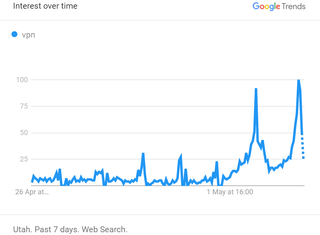Porn VPN searches soar in Utah amid age verification bill
Porn fans living in Utah, United States, seem to be turning to VPN services as a means to circumvent current Pornhub restrictions.
The blocks come into force on May 1, as an act of protest ahead of a state bill (opens in new tab) that will require all porn websites to enforce an age verification system. Google searches for virtual private networks (VPNs) have been skyrocketing since, with a peak registered on May 3, the day the new law came into force.
Utah’s age verification law to “disregard data privacy”
“Utah’s age-verification law shows a worrying trend to further restrict digital freedoms and disregard data privacy across the US,” said a spokesperson of secure VPN provider Private Internet Access (PIA).
Utah is indeed the last US state to have introduced mandatory age verification to access porn websites. Similar announcements were also previously released by authorities in Louisiana and Arkansas.
Albeit realizing the importance of preventing minors from accessing inappropriate content online, PIA believes that collecting IDs for age verification purposes also presents unacceptable privacy risks.
“The introduction of online age verification in yet another state means that for those wanting to access adult entertainment, a huge amount of personal, sensitive data will now be collected—data that could be improperly used, accessed, or leaked.”
At the same time, such laws often turn out to be ineffective, too.
By downloading a VPN service, pornography fans will be able to keep accessing Pornhub and similar sites with ease. That’s because a virtual private network is security software able to spoof users’ IP address (digital location and device identifier).
Hence a surge of interest in VPNs across Utah as people will simply need to connect to a server located in a US state or foreign country where the restriction isn’t yet enforced.
“Private Internet Access is a long-time advocate of greater digital privacy, and we urge lawmakers to consider other ways of protecting children online, including education, guidance from parents, and open conversations about safe internet usage, rather than relying on increasingly intrusive digital regulations which disregard people’s privacy and online freedom.”


